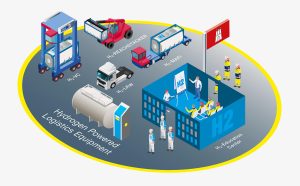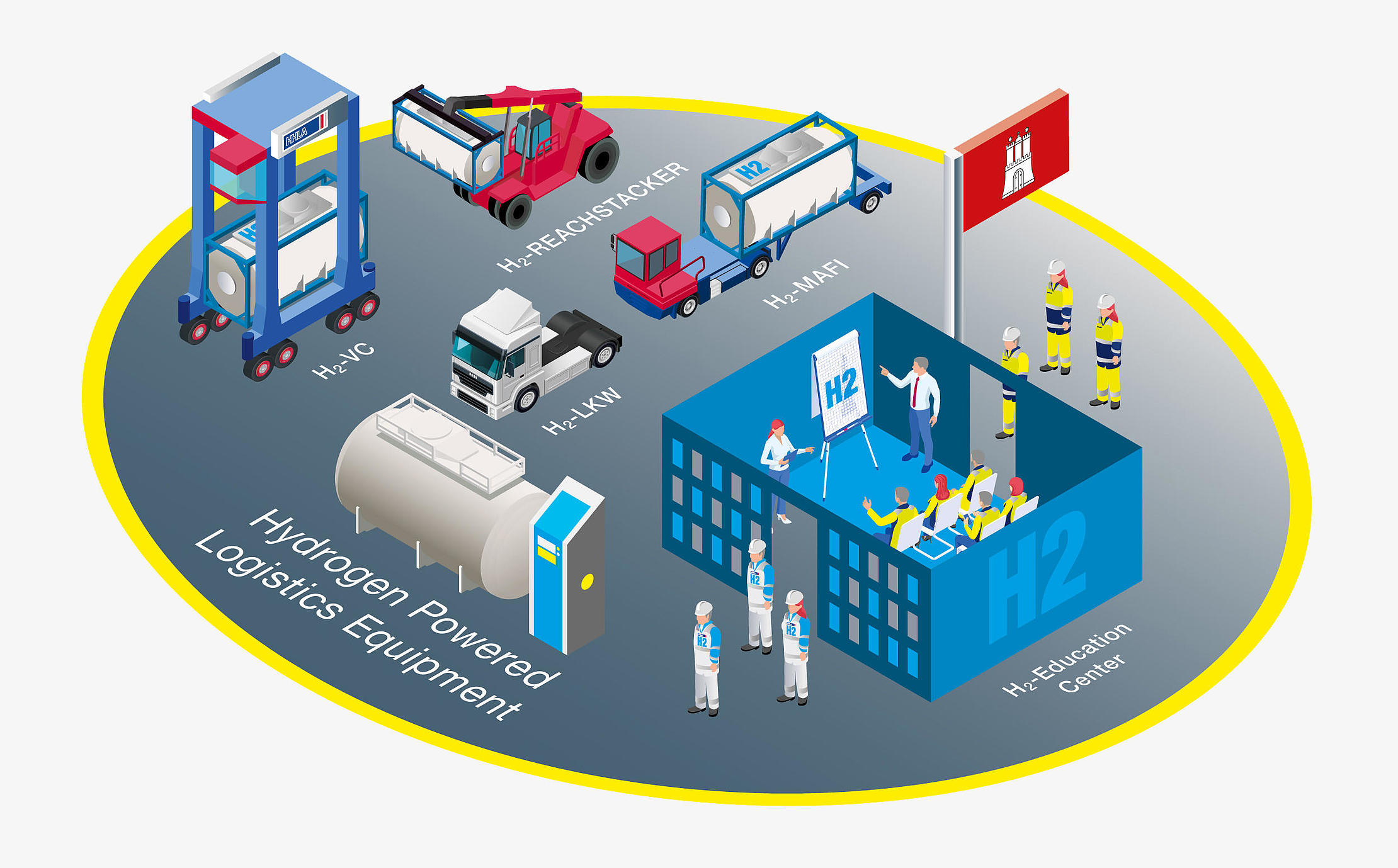
The CPL parties are cooperating nationwide to conduct research into how hydrogen can be used to supply power to port technology and port logistics. Source: HHLA
Hydrogen-powered port logistics equipment represents a transformative shift towards sustainable and zero-emission port operations, crucial for improving local air quality and meeting decarbonization goals. This category includes yard tractors, terminal trucks, and rubber-tyred gantry (RTG) cranes that are powered by hydrogen fuel cells instead of conventional diesel engines. These fuel cells generate electricity through an electrochemical reaction between hydrogen and oxygen, producing only water vapor and warm air as byproducts, thereby eliminating harmful emissions like nitrogen oxides (NOx) and particulate matter at the point of use. While the transition to this technology requires significant investment in on-site hydrogen production, storage, and refueling infrastructure, the benefits are substantial; hydrogen-powered equipment offers faster refueling times compared to battery charging and can support the intensive, 24/7 operational demands of a bustling port without the long downtime, positioning it as a key enabler for the green ports of the future.
An innovation cluster is being created to test hydrogen-powered port logistics equipment. Hamburger Hafen und Logistik AG (HHLA) has established Clean Port & Logistics (CPL), an innovation cluster which aims to accelerate market maturity and integrate hydrogen port equipment into regular port operations.
“Port handling and heavy goods logistics will make their contribution to climate protection and improving the quality of life in urban areas. The key element here is the decarbonisation of logistics that can also be achieved with the help of hydrogen as the operating energy,” said Angela Titzrath, chairwoman of HHLA’s executive board.
Government backing
Although HHLA is in charge of managing the cluster, CPL brings together equipment manufacturers, port and logistics companies, academic partners, producers of renewable hydrogen, software companies and operators and manufacturers of storage tank locations.
The cluster is carrying out simulations and investigations and developing training concepts. At the core of activities will be a test centre for hydrogen-powered equipment at the HHLA Container Terminal Tollerort in Hamburg.
The cluster will be sponsored by Germany’s Federal Ministry of Transport and Digital Infrastructure as part of a national innovation program for hydrogen and fuel cell technology. The funding guidelines will be coordinated by NOW GmbH and implemented by Projektträger Jülich (PTJ).
As part of CPL, HHLA has already agreed to the first memorandum of understanding for delivering hydrogen-powered empty container handlers and terminal tractors with Hyster Yale Group Inc. The units will be powered by Nuvera fuel cells.
The delivery of the terminal tractor is planned for the end of 2022, followed by the empty container handler in early 2023.
Source: portstrategy.com


Your article helped me a lot, is there any more related content? Thanks!
Good post but I was wanting tto now if you could write
a litrte more on this topic? I’d be very grateful if you could elaborate
a little bit further. Thanks!
Thanks for sharing. I read many of your blog posts, cool, your blog is very good.
Thanks for finally writing about > Hydrogen test bed for hydrogen-powered port logistics equipment – Maritime Education Post538287
Thanks for sharing. I read many of your blog posts, cool, your blog is very good.
Thank you for your sharing. I am worried that I lack creative ideas. It is your article that makes me full of hope. Thank you. But, I have a question, can you help me?
Hi all, her every person is sharing these kinds of
knowledge, so it’s good to read this webpage, and I used to go to see this
website daily.
Thank you, your article surprised me, there is such an excellent point of view. Thank you for sharing, I learned a lot.
Super insightful and fresh perspective.
Very practical and actionable tips.
I truly appreciate your technique of writing a blog.